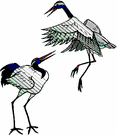And Sora hatchlings too!
While following up on the Virginia Rail hatchlings, I looked for the Soras that I hear calling every time I am at the wetlands where these are found. Not only did I see at least one adult Sora but I spotted at least 3-4 Sora hatchlings. They were huddled together on top of some foilage about 20 feet into the wetland vegetation. As I was about 35 feet from them I couldn't quite see just how many there were. They appeared even a little smaller than the Virginia Rail hatchlings were when I first saw them (and when they were probably less than 7 days old).
 I wasn't able to get a better pic due to all the vegetation that was hanging in between, especially since there was a good breeze and the leaves were moving across the opening in which I was watching these hatchlings. However it is possible to see a small black body with some orange around it's yellowish beak. Birds of North America (BNA) online states, "Covered with thick, glossy black down, with tuft of orange bristles beneath chin." It further says that their bill is yellow with a reddish base. A little more detail can be seen by double-clicking on the pic to enlarge it (though the clarity diminishes).
I wasn't able to get a better pic due to all the vegetation that was hanging in between, especially since there was a good breeze and the leaves were moving across the opening in which I was watching these hatchlings. However it is possible to see a small black body with some orange around it's yellowish beak. Birds of North America (BNA) online states, "Covered with thick, glossy black down, with tuft of orange bristles beneath chin." It further says that their bill is yellow with a reddish base. A little more detail can be seen by double-clicking on the pic to enlarge it (though the clarity diminishes). I only got to watch these hatchlings briefly as a parent that was patrolling near them gave some alarm calls and they retreated into the thicker vegetation. BNA says that the chicks don't usually start leaving the nest until 3-4 days old in one section then in a subsequent section cites literature indicating that they start leaving the nest at 2-3 days old "to feed nearby" (parents still give them food for 2-3 weeks but apparently they begin feeding themselves then). Interestingly it also says that hatchlings are brooded near the nest by a parent for the first 4-7 days, and that they may brood them in the water. This may be done while the other parent continues to incubate unhatched eggs. Since they usually lay 8-11 eggs, the other parent may still be on the nest.
While I was watching, a commercial jet plane flew fairly close overhead, making a lot of jet noise. The Soras made their whinny call during this disruption and I thought that they might be giving an alarm call in response to the airplane noise (I was standing still and hidden by a tree so I don't think they were calling relative to my presence at this time, though they did when I moved about the area). And BNA notes that this species does call in response to loud noises










